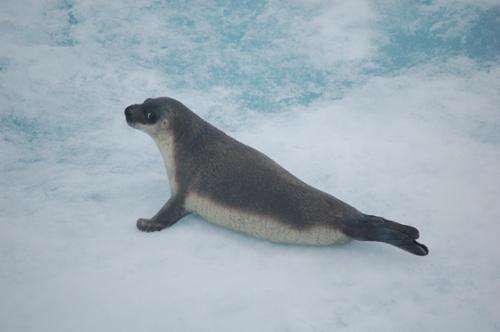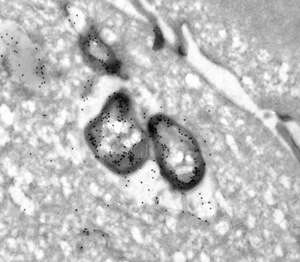Bacterium Brucella pinnipedialis has little effect on health of hooded seal

A doctoral research project studying the bacterium Brucella pinnipedialis, which commonly occurs in hooded seals, found that this bacterium does not cause disease in hooded seals, as other Brucella bacteria do in other species.
The occurrence of the bacterium B. pinnipedialis in hooded seals can hence not explain the decline in the Northeast Atlantic population of hooded seals. The potentially immunosuppressive effects of the pollutant PCB 153 may affect the immunedefence system of the hooded seal to the extent that the outcome of the infection is altered, but no such effects were found to occur in an experimentalinfection in mice.
Bacteria belonging to the Brucella group are the cause of brucellosis (undulant fever), a disease that can be transmitted from animals to humans, most commonly through the ingestion of unpasteurized milk. Typical features of a Brucella infection are the chronic presence of the bacterium in the host and the multiplication of bacteria in the genitals, which can lead to miscarriages and infertility. Brucella bacteria are known to occur in different species of seal and whale in most parts of the world.
There are two populations of hooded seals, one in the Northwest Atlantic and one in the Northeast Atlantic. The population in the Northwest Atlantic has increased since the 1980s, whereas that of the Northeast Atlantic today stands at only 10-15% of the numbers counted in 1946. Earlier studies have revealed that there are more Brucella-positive seals in the declined Northeast Atlantic population, compared to the increasing Northwest Atlantic population. At the same time, high levels of pollutants have been found in hooded seals and other species high in the food chain in the Arctic. PCB 153 is the most abundant variant of PCB in the Arctic, but we do not yet know whether this high level affects the immune defence system of the hooded seal and thereby its ability to withstand infections.

Even though the infection biology of B. pinnipedialis is still unclear, the results of Nymo's research indicate that this bacterial strain does not cause disease in the way we usually expect the known pathogenic strains of Brucella to do. It therefore seems unlikely that this strain of bacteria affects the health of hooded seals under natural conditions. This conclusion corresponds with the general lack of signs of disease in other species of seals infected with B. pinnipedialis. Experimental exposure to PCB 153 was not shown to have any demonstrable effect, but it is still unclear whether exposure to PCB 153 under natural conditions effects the health of hooded seals by changing the outcome of a B. pinnipedialis infection.
Cand.med.vet. Ingebjørg Helena Nymo defended her doctoral research on the 26th of September 2013 at the Norwegian School of Veterinary Sciencewith a thesis entitled: "Brucella pinnipedialis in hooded seals (Cystophora cristata): infection biology and effect of PCB 153 exposure under experimental conditions".
Provided by Norwegian School of Veterinary Science


















